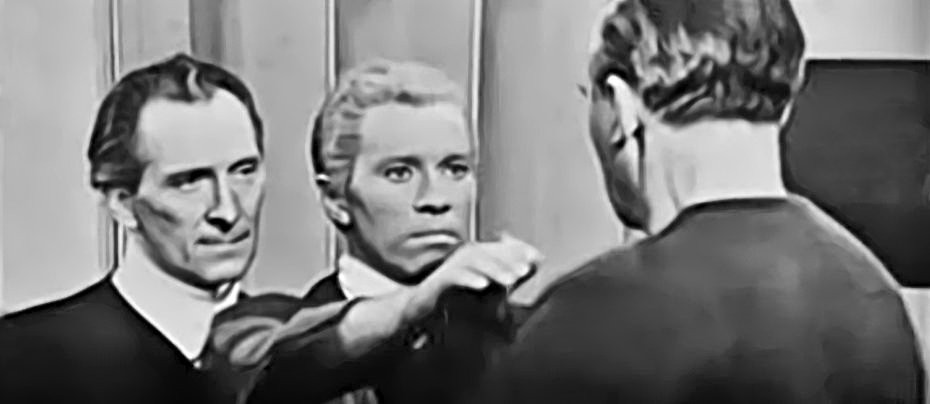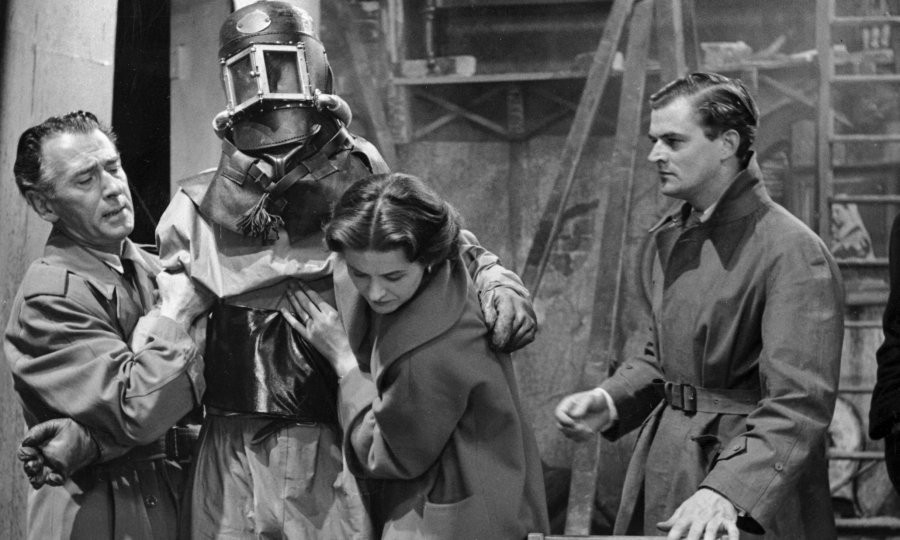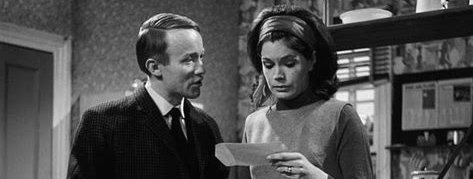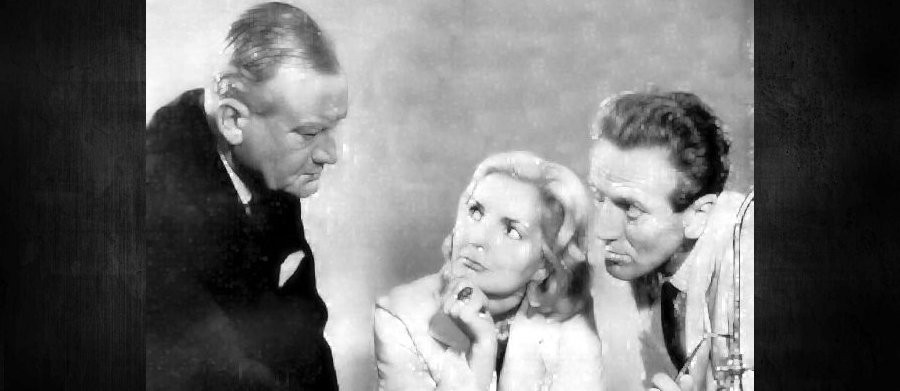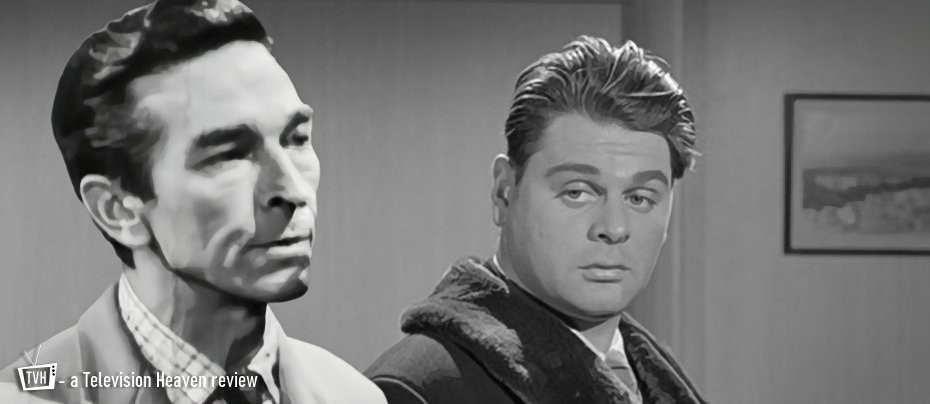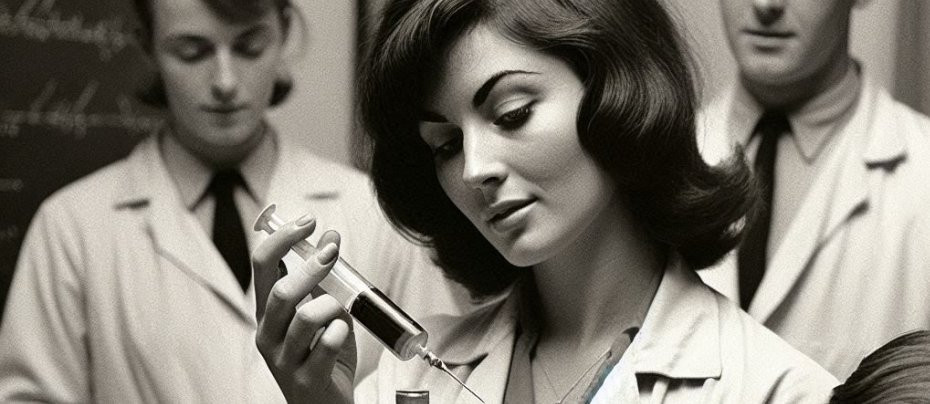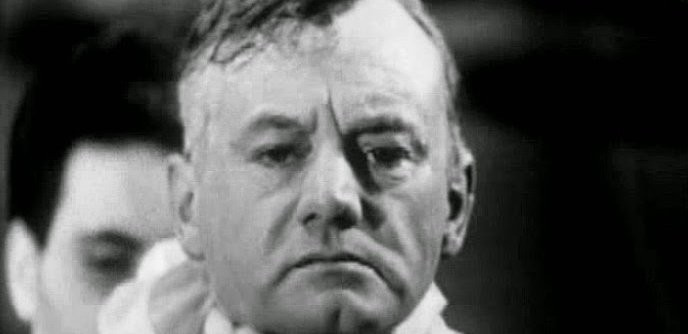
Quatermass II
Quatermass II is not as well-regarded as the two serials broadcast either side of it. Aired two years after the original Experiment, but seemingly set some time later, Quatermass II certainly compares very favourably with its forebear in one capacity: its ambition. The Quatermass Experiment concerned itself with the fate of a single spaceship crew, the threat to mankind extrapolated from this and prevented by Quatermass's actions. The sequel, in contrast, begins with a nationwide, even worldwide, threat already in its advanced stages. While the first story placed a single unearthly influence at the centre of events and pit the Professor against it, the follow-up sees Quatermass increasingly outnumbered in a world that is becoming ever more hostile.
Sadly, Reginald Tate died shortly before location filming for the serial began, necessitating a recasting of the title role. John Robinson is less impressive as Quatermass, giving an austere, uncomfortable performance that lacks Tate's warmth. This, perhaps more than any other reason, is the reason for the serial's relative unpopularity compared to its predecessor. In his defence, Robinson has an authority and an air of power that allow him to dominate the screen, above most of the other cast members. The harder edge to his version of Quatermass is also, feasibly, in character; we meet Quatermass here as a failure, his new rocket design having exploded catastrophically upon launch at Woomera, Australia. Robinson's best scene comes early on, as he admits defeat to his colleagues and daughter, aware that he shall never get funding to try his experiment again after such a tragedy.
More impressive is Hugh Griffith as Quatermass's right hand man Dr. Leo Pugh. Griffith gives a strong, characterful performance as the pressured yet positive mathematician, and his Welsh accent lets him stand out amongst the RP squad around him. His is undoubtedly the best performance in the serial. The same can't be said of John Stone, who, as Captain Dillon, sets events in motion by bringing Quatermass into his investigation of the mysterious complex at Winnerden Flats. Dillon is infected and dragged away by the 'zombies' of the operation. He returns in the final episode, possessed by the alien force, which at least comes as a surprise as I had quite forgotten his involvement. However, even Stone's wooden performance is positively vital when compared to that of Monica Grey. Playing Paula Quatermass, daughter of the Professor, she manages to deliver every line as it she were reading it as an exercise in elocution. She and Robinson manage to convince that they are related, just about, if only by being similarly stolid in the face of danger, but she displays little warmth at all for her fiance Captain Dillon. Then again, who could?
The first two episodes of the serial are an exercise in tension. The production goes for a slow build-up, as the extent of the alien conspiracy becomes gradually apparent. It's a fair complaint that these opening instalments are too slow, and there are times at which they seem to drag. In spite of the leisurely pace, vital revelations occur frequently throughout, as the nature, and scope, of the threat becomes clear. At first there's simply the mystery of a base where a village once was, along with the curious meteorite landings. This leads in turn to Dillon's abduction, which puts Quatermass up against the wall of secrecy around the base. As he investigates further, discovering that what appears to be his design for a moonbase is in fact a processing plant for synthetic food, the true extent of the conspiracy becomes clear, as police and politicians are revealed to be under the alien influence.
The pace hastens in the third and fourth episodes, as Quatermass is drawn further into the aliens' plans and events spiral out of his control. Episode three, 'The Food,' takes us into the heart of the complex, as Quatermass and two allies, Fowler and Ward, attempt to gather intelligence on the alien operation and their 'food process.' There's a truly horrific moment as Ward stumbles from the food tank, drenched from head to foot in thick, black oil, and ammoniac sludge that burns his skin. Deducing that the alien life forms must exist in such an environment, Quatermass realises what the plant is actually for: producing food, not for humans, but for an utterly inhuman intelligence. The fourth and fifth episodes are the best of the serial, as the Professor first returns to his own headquarters and then takes the fight to the enemy. Quatermass capitalises on his notoriety and enlists the help of the press, in the form of Conrad, played with aplomb by the now-legendary Roger Delgado.
These episodes play to the programme's strengths, by having an alien presence intrude into a recognisable world. As interesting as events in laboratories, space control HQ and the Houses of Parliament may be, most people watching would have no experience of them. In taking events to a knees-up at the workers' pub in Winnerden Flats, we finally see the effect of the alien incursion on everyday men. As the invasion begins in earnest, meteors raining from the sky, ordinary men go to war against an unknowable threat. Scenes and images stick uncomfortably in the mind. The churning, broiling mass of alien 'ammonid' biomass, seen through an inspection hatch on the processing tank. The horror on one worker's face as he dips his hand in blood and realises that his colleagues have been used to plug the oxygen pipe. The sheer chaos as the plant is destroyed, noxious gasses streaming out as Quatermass flees in terror. It is not surprising that the later episodes of the serial went out with a cautionary warning to those of a nervous temperament; such scenes may be mild today, but they were very strong stuff for Fifties television.
However, the serial stumbles at the last hurdle. Episode five ends on something of a false climax, as the Winnerden Flats complex is destroyed, but the worldwide threat remains, leaving episode six, 'The Destroyers,' with the job of finally finishing the 'ammonids' off. In a rather implausible plot development, Quatermass and Pugh take the remaining experimental rocket into space, in an attempt to take the fight to the enemy and destroy their asteroid base. These two middle-aged gentlemen make pretty unconvincing astronauts, and the space journey is sadly rather too much for the production team's effects techniques to cope with. The final moments do contain some diverting material, particularly as the likeable, reliable Pugh becomes one of the aliens' puppets and fights Quatermass, but things fall apart quickly as he is swept away into space, feebly crying out 'Help! Help!' for the next five minutes. It's an unintentionally humorous conclusion to a decidedly grim serial.
The final episode notwithstanding, Quatermass II is a successful production. Its exploration of a world in which the most trusted institutions of law and government are subject to perversion was years ahead of its time, portrayed in a way which even The X-Files, forty years later, couldn't match. In a time when secret military installations still existed, after ten years of peace, and faith in the government was beginning to erode, Quatermass caught hold of a developing paranoia and used it as the basis of a tense, disquieting drama. While it does, in some ways, compare unfavourably with its sister serials, I wonder how it would be viewed if only two episodes existed, as with its predecessor? If only the powerful, taut fourth and fifth installments existed, opinion on the story might be altogether more favourable. Nonetheless, we can be grateful that it led to the third, and perhaps best serial, Quatermass and the Pit, if only because that way we know that Professor Quatermass managed to get back home from space somehow...
Published on February 21st, 2019. Written by Daniel Tessier (January 2012) for Television Heaven.





